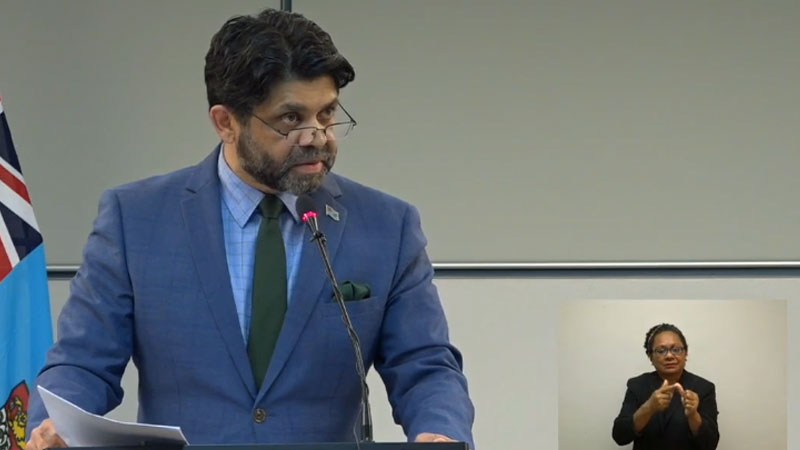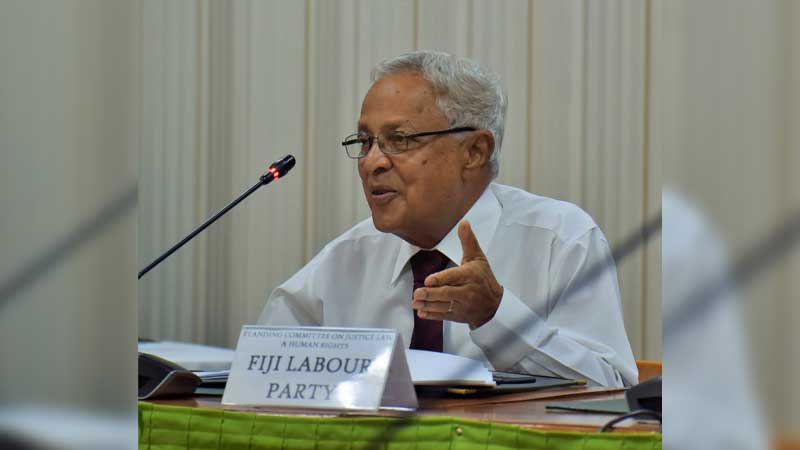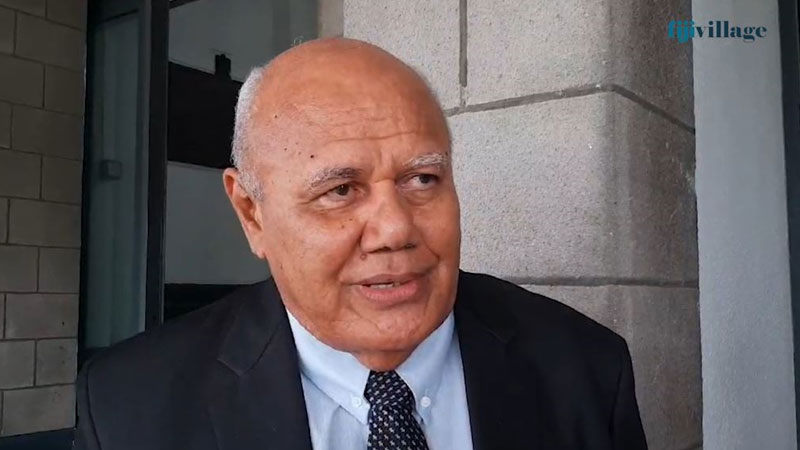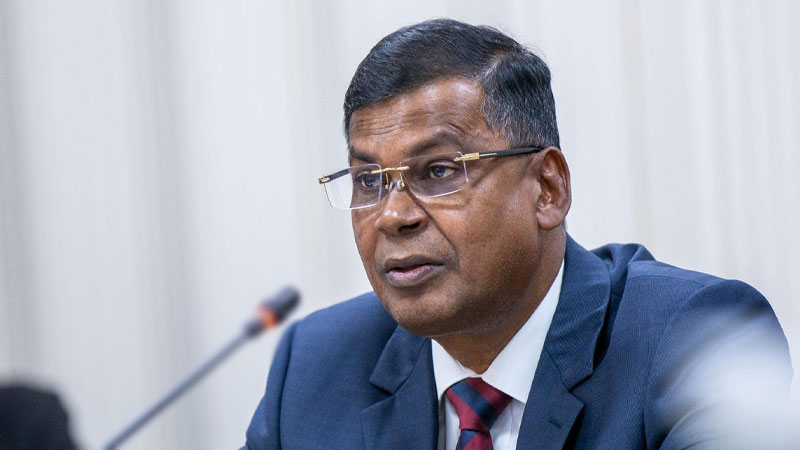
Attorney General and Minister for Economy Aiyaz Sayed-Khaiyum says the data released by the Fiji Bureau of Statistics in their 2019-2020 Housing Income and Expenditure Survey cannot be relied upon and he says there are huge integrity issues in respect of how they chose the sample.
Sayed-Khaiyum says there was a sample of 6,000 people from 199,688 families.
The Attorney General says they are not challenging poverty statistics because they want to know as much about it as possible and address the issue of poverty.
He says what they are challenging is the reliability of this kind of statistics and it has exposed the Bureau that they are now carrying out ethnic analysis based on a flawed system.
Sayed-Khaiyum says if we are going to start having compassion for people based on their ethnicity then we are losing our sense of humanity.
The Attorney General says if we look at the releases put out by some of the political parties, they have immediately jumped on the ethnic bandwagon.
He says it is unfortunate that the Bureau has released the results of the 2019-2020 Housing Income and Expenditure Survey with ethnic and religious breakdown.
The Minister for Economy says in the report there is a map that shows where these samples were taken from and a number of them are from the interior, rural or maritime areas.
Sayed-Khaiyum says if the Bureau is basing this survey on the 2017 population census, then this is highly questionable because the 2017 census had no reliable ethnic data.
He says former Government Statistician Epeli Waqavonovono had said in 2018 that there was no reliable collection of data on ethnicity in the 2017 census and as a result no data on ethnicity could be accurately released.
The Minister for Economy says Waqavonovono had also said that many enumerators failed to ask for the respondents ethnic background and the data was instead based on the assumption of the enumerators.
Sayed-Khaiyum says the report has not delved deeply into how they assumed that for these 6,000, they have some sort of ethnic representation.
He adds the report also has some basic mistakes.
The Attorney General says they appreciate any independent office carrying out a proper professional analysis of any data.
Sayed-Khaiyum says many people do not know that the government approved the new methodology of moving away from using the traditional income measure for welfare analysis to using consumption expenditure for poverty measurement.
He says this does not only look at how much money you have.

Fiji Labour Party Leader, Mahendra Chaudhry says it is absolutely shocking that the iTaukei population constitute 75 percent of the 258,053 people living in poverty in our country.
According to the Fiji Bureau of Statistics Housing Income and Expenditure Survey 2019-2020, 30 percent of Fiji’s population lived in poverty with Indo Fijians comprising 23 percent of this compared to 75 percent of the iTaukei.
Chaudhry says these are pre-COVID figures and are already outdated.
He says the situation today as a result of the devastating impact of COVID-19 on the economy, would be much worse with the rate of poverty close to 50 percent.
Chaudhry further says if people living on the edge of poverty were taken into consideration, the figure could be as high as 60 percent.
He says the deteriorating social conditions of the indigenous Fijian community is alarming.
In a statement, Chaudhry says in the years before the 2006 coup, the difference in poverty levels among the iTaukei and the Indo Fijian population was negligible.
He says in other words, there were as many poor Indo Fijians as poor iTaukei.
The former Prime Minister says this enormous gap between the two major communities now is unsettling and could have very serious ramifications in terms of social stability. Chaudhry says the iTaukei could see themselves as being marginalized in their own land which could lead to resentment with serious political repercussions.
He also says we have to ask ourselves how this huge gap was created and according to him, it shows that the iTaukei community is being neglected by the government.
Chaudhry says the survey also showed an alarmingly high level of poverty in the rural sector (62 percent) as opposed to 37 percent in the urban centres. He says this again is a reflection of the government’s policies (or lack of it) for the rural sector.
According to the FLP Leader, the deteriorating state of rural infrastructure and the neglect of agriculture and other primary resources, have had a marked impact on the income of the rural people. He says Government policies have been too lopsided with a heavy emphasis on tourism.
Fijivillage has approached Minister for Economy, Aiyaz Sayed-Khaiyum and Minister for Women, Children and Poverty Alleviation, Rosy Akbar for comments on the Fiji Bureau of Statistics Household Income and Expenditure Survey 2019-2020 and on the work being done to address poverty in the country. They are yet to respond.

SODELPA Leader, Viliame Gavoka says the 2019-2020 Household Income and Expenditure Survey has shocked them to their core as he says on ethnic basis, 76 percent of the poor are iTaukei and by religion 78 percent of the poor are Christians.
Gavoka says this was in 2019 and 2020 and one can imagine what it is like in 2021 with the COVID-19 pandemic.
He adds SODELPA has always decried the poverty of the iTaukei, calling it as the ‘elephant in the room’.
The SODELPA Leader says it looms large and cannot be ignored, but that is exactly what the FijiFirst Government has been doing by ignoring it.
He says one wonders about the Bainimarama boom.
Gavoka further says this is very serious and SODELPA will insist that poverty of the iTaukei is central to the discussions in Fiji.
He says they will chart their own policies on the way forward to combat poverty.
SODELPA has also shown appreciation to the Fiji Bureau of Statistics for factoring ethnicity in the report.

National Federation Party Leader, Professor Biman Prasad says the fact that 29.1%t of the Fijian population were in poverty before the COVID-19 pandemic was alarming and he believes that the “Bainimarama Boom” was a myth and a vote-buying gimmick.
Prasad says government has always bragged about the so-called 9 years of unprecedented growth and boom, yet, poverty increased from 28.1% that was established by the 2013-2014 Household Income Expenditure Survey to 29.9%nt in less than 6 years.
He further says undoubtedly, it has increased to 50% because an estimated 20% would have fallen into poverty because of massive unemployment.
Prasad adds and those already in poverty are likely to have slid into abject poverty especially in rural areas and informal settlements in urban and peri-urban areas after the outbreak of COVID-19 resulted in severe economic decline.
Prasad says it is absolutely clear that government’s social wage policy in terms of welfare assistance, other allowances like water, electricity subsidies and a restrictive list of free medicine, tuition-free education and freebies before the 2018 elections did not alleviate poverty because statistics by government’s own official agency don’t lie.
He adds instead of uplifting the lives and livelihood of people, the monetary assistance was used for consumption due to the exorbitant cost of living of food and medication.
Prasad says we now have an impoverished nation where 50% of our people may be struggling to put food on the table for their children and families. Prasad also says however, this government is clueless on how to provide meaningful assistance and all it is good at is bragging about their failed policies and patting each other’s backs.
He adds a change of leadership and a new direction and vision is needed, and the NFP is ready to rebuild lives and heal the fractured nation.
We have sent questions to Minister for Women, Children and Poverty Alleviation, Rosy Akbar on the work of the ministry to deal with people affected by poverty.
Click to read: 2019-2020 Household Income and Expenditure Survey Report
Stay tuned for the latest news on our radio stations

